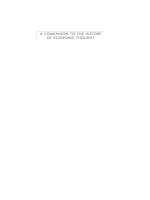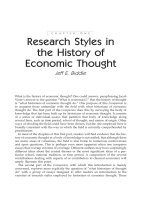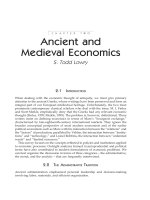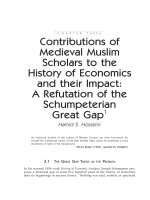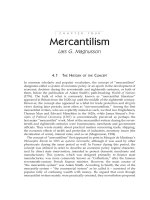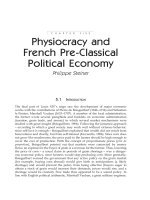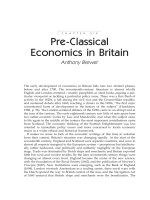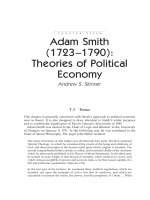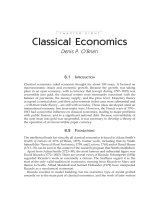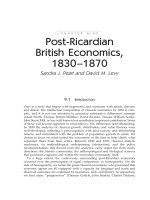A Companion to the History of Economic Thought - Chapter 14 potx
Bạn đang xem bản rút gọn của tài liệu. Xem và tải ngay bản đầy đủ của tài liệu tại đây (205.15 KB, 16 trang )
HISTORICAL SCHOOLS OF ECONOMICS: GERMAN AND ENGLISH 215
CHAPTER FOURTEEN
Historical Schools
of Economics:
German and English
Keith Tribe
14.1 INTRODUCTION
Identification with “historical economics” implies a critique of prevailing ortho-
doxy. This reflex is as old as “modern economics”; arguments both for and against
the progressive formalization of economics have gone hand in hand with either
negative or positive reevaluations of the recent history of economic argument.
Historical economics has developed in parallel with “abstract” economics, can be
dated from the early nineteenth century, associated with the writings of Adam
Müller and Friedrich List in Germany, and with William Whewell and Richard
Jones in Britain. In their different ways, these and other writers argued that the
work of Adam Smith, or of David Ricardo, sought a political economy founded
upon economic laws that were valid for all times and all places. Political economy
had become in this view “in a great measure a deductive science: that is, certain
definitions were adopted, as of universal application to all countries upon the
face of the globe and all classes of society; and from these definitions, and a few
corresponding axioms, was deduced a whole system of propositions, which were
regarded as of demonstrated validity” (Whewell, 1859, p. x). German historical
economists took a similar position, but were more inclined to argue that classical
economists assumed that their axioms represented the natural laws of economic
life. To this was opposed the project of constructing an inductive, historical
science, in which the diversity of economic circumstances was properly recog-
nized. What therefore unites all those concerned with the project of a historical
economics, then and now, is allegiance to an inductive, empiricist approach to
216 K. TRIBE
economic theory, and hostility to a deductive, axiomatic economics. “Historical
economists” are not, however, all of a piece; quite apart from variations in their
degree of understanding of and sympathy with modern economics, the nature
of “history” and “historical method” has altered substantially in the course of
two centuries. Some caution is therefore in order when addressing the nature of
“schools” of historical economics.
The most well known such school flourished in nineteenth-century Germany,
from the 1840s to the early 1900s, and represented a national mainstream that
was skeptical of classical economics as understood in Britain and France. Strictly
speaking, there were two such schools: an “Older School,” conventionally associ-
ated with the writings of Wilhelm Roscher, Carl Knies, and Bruno Hildebrand;
and a “Younger School,” whose foremost member was Gustav Schmoller, but
which embraced most academic economists of the newly united Germany after
1871. Importantly, all these economists explicitly identified themselves as mem-
bers of a “historical school” – Max Weber, in his inaugural lecture as Professor
of Economics and Financial Science at the University of Freiburg, referred in
passing to himself as one of “the younger representatives of the German histor-
ical school” (Weber, 1989, p. 200). That this school included primarily German
nationals rather than German speakers was pointed up by the notorious “debate
on method” between the Viennese economist Carl Menger and Gustav Schmoller,
in which the former argued that historical and theoretical economics were
complements, rather than substitutes, as Schmoller had suggested. Menger’s
argument that economic theory was not therefore susceptible to inductive devel-
opment was abusively denounced by Schmoller, although the German project of
historically founded economic theory, chartered by Wilhelm Roscher in 1843,
remained an unfulfilled project to the very end. Nonetheless, although this project
to refound economics upon an inductive basis failed, the project itself did have
important consequences, not least that its proponents taught several generations
of students.
The place of economics teaching in the late-nineteenth-century German univer-
sity was secured by its place in the legal curriculum; not until the 1920s was a
separate, nondoctoral qualification in economics introduced. Since a qualification
in law was routinely required for posts in public administration, as well as the
legal system itself, this ensured that large numbers of public servants and private
employees were exposed to general economic principles. Furthermore, the Ger-
man university was the international model, enjoying qualitative and quantitative
supremacy over universities in Britain, France, and the United States. German
universities were state universities, open to all with an appropriate educational
background. Students in post-bellum America seeking advanced teaching in
economics naturally gravitated to Germany, since in England there was very
little systematic teaching of economics, and no graduate qualification as in
Germany; while the French university system was then (and still is) firmly linked
to a closed educational and cultural system. Many American students returned to
teach in the rapidly expanding American university system, later contributing
to the development of an American institutionalist economics that drew heavily
on German historicism.
HISTORICAL SCHOOLS OF ECONOMICS: GERMAN AND ENGLISH 217
English historical economics was by contrast marginal to a mainstream rep-
resented by the work of John Stuart Mill, William Stanley Jevons, and Alfred
Marshall. For the most part its roots lay in the work of Henry Maine and John
Stubbs, and there was little direct connection with German historicism. Two
leading proponents, William Cunningham and William Ashley, authored the
first textbooks of economic history in the later nineteenth century, and the latter
played an important role in the formation of the Economic History Society in
1926. The resulting institutional separation of economists and economic historians
is thought to have facilitated in turn the accelerated development between the
wars of an academic economics purged of historical content (Koot, 1987). The
story is, however, more complex that that. William Ashley never did assign great
importance to economic analysis, even when designing a business curriculum: at
the Faculty of Commerce in Birmingham, which he founded in 1902, formal
tuition in economic principles was confined to the first year (Ashley, 1902). William
Cunningham repeatedly denounced the influence of Alfred Marshall’s new
economics, arguing that the new style of economic reasoning had prevented eco-
nomists from “. . . attempting to imitate the careful observation of facts both in
the past and the present, and limited generalisation from them, which has brought
about progress in other sciences, and which has been the accepted method of
study by the realistic or historical school of German economists for a generation
or more” (Cunningham, 1894, p. 326). That Marshall was an inveterate collector
of “facts” was ignored by Cunningham, as were the early chapters of Marshall’s
Principles, devoted as they were to a historical account of economic development.
Above all, English economists whose work shared historicist features did not
consider themselves to be members of any particular school, as did their German
contemporaries. The “historicist critique” went through its most vociferous phase
in Britain during the 1870s and 1880s, a time when there was little systematic
teaching of economics in English universities and colleges, and hence little conse-
quence in arguing one way or the other as far as employment and teaching went.
During the 1890s regular teaching became more common, but the impulse to
shape the new curricula in historicist terms was lacking. English historical eco-
nomics, in short, failed to make the transition from a literature of controversy to
one of pedagogy, a transition effected by “mainstream economics” at the turn of
the century. As a tendency, English “historical economists” became quite marginal
to the increasingly academic teaching of economics, which is not something one
could say of their German counterparts; and, apart from the lack of academic posts
in Britain, English historicists also lacked the organizational coherence that German
economists gained with the foundation of the Verein für Socialpolitik. Strictly speak-
ing, there never was an “English historical school of economics,” but simply a
series of authors with criticisms of the economics of their time and with a historical
cast of mind.
This absence of an English “school” had therefore institutional as much as
intellectual foundations. In Germany those who might be considered “economists”
would by the later nineteenth century have been principally defined by their
employment as a teacher of economics in one of the several state universities.
Chairs of economics had existed in Germany since the eighteenth century, and
218 K. TRIBE
although the teaching delivered from these posts was transformed over time
along with the subject, the posts themselves were a constant feature of the univer-
sity landscape. This teaching was for the benefit of students of law, attendance
at a course of lectures in economics being a compulsory part of legal education.
Those who studied economics for its own sake were by definition doctoral
students, there being no other qualification; this was a formal requirement for
university teaching, and it was also important for entry into some parts of state
administration. When linked to the system of formal and informal contacts
through which students entered employment, this added to the power and influ-
ence of professors such as Schmoller, who were able to assign doctoral topics to
a growing band of students and draw upon public funds for the prosecution of
research.
Nothing like this existed in Britain until later in the twentieth century. In the
mid-1890s there were only two full-time Professors of Political Economy – Marshall
in Cambridge and Gonner in Liverpool – although some teachers, such as Flux
in Manchester, were fully occupied with a wide range of teaching (Tribe, 1993,
pp. 200–2). When the British Economic Association was formed in 1890, its chief
purpose was to secure the new Economic Journal from domination by any one
particular tendency or group, not to promote public discussion of economics.
Public discussion did take place at the annual meetings of the British Association
for the Advancement of Science, but the ad hoc manner in which contributions
were made and the diffuse background of the audience imposed inevitable lim-
itations. Academic economists in Britain did not have their own organization
until the formation of the Association of University Teachers of Economics in the
1920s; while the Political Economy Club had always been a private dining club
dominated by nonacademic economists (Tribe, 2001, pp. 32–4). The major pro-
tagonists of historical economics in Britain – Ingram, Cliffe Leslie, Ashley, and
Cunningham – made their presence felt through their writing, and the occasional
speech. They had no national or institutional platform onto which they could
draw younger adherents; nor, in truth, did the new academic economics until
Alfred Marshall set about laying some foundations. The principal reason for the
demise of English historical economics as a viable intellectual program in the
early twentieth century was that the new economics succeeded in establishing
itself academically, and historical economics did not. Instead, the heirs of Thorold
Rogers and Cunningham went on to found the Economic History Society in 1926,
a movement whose principal dynamic came from historians, rather than from
disgruntled economists.
14.2 THE GERMAN HISTORICAL SCHOOL
By the 1830s, the economics taught and published in Germany was pragmatically
eclectic, drawing widely on contemporary English and French political economy,
but simply integrating this work with existing German work on the subject. As
elsewhere in continental Europe, the writings of Jean-Baptiste Say had a greater
substantive impact than that of the English writers, and Say’s manner of combining
HISTORICAL SCHOOLS OF ECONOMICS: GERMAN AND ENGLISH 219
the concept of value with utility and need, rather than labor, meant that patterns
of consumption played a more prominent part in the development of continental
political economy than was the case in Britain, where the emphasis was more
on production and distribution, linking value to labor. In this light, Marx’s polit-
ical economy is a distant echo of earlier, English, preoccupations, detached from
contemporary continental literature. This characteristic focus upon utility and
need was to influence decisively the formation of a new subjective economics
in the later nineteenth century, but in the early part of the century the contro-
versy that had characterized English debates was absent. The leading German
textbook was Rau’s Lehrbuch der politischen Oekonomie, the first volume being
published in 1826, reaching its ninth edition in 1876. Rau’s text was “modern,”
and distinct from an eighteenth-century cameralistic tradition where the dis-
cussion of economic activity was linked to the work of economic administration;
but although Rau incorporated elements of Smithian political economy, his book
enumerates economic objects rather than presenting instruments of economic
analysis (Tribe, 1988, ch. 9). More contentious in tone was Friedrich List’s critique
of Smithian “cosmopolitan political economy” presented in Das nationale System
der politischen Oekonomie (1841), where he argued that the universal economic
laws expounded in the Wealth of Nations failed properly to take account of
national and historical differences. However, List was not strictly an exponent of
a historical, let alone an inductive, approach to economics systems, and in any
case the main lines of his critique of Adam Smith were borrowed from American,
not German, writers.
It is generally agreed that the programmatic foundation of German historical
economics can be found in a lecture outline published by Wilhelm Roscher
in 1843. His prime objective in these lectures, he argued, was not a better under-
standing of national wealth and its increase, but instead
a representation of the economic aspect of what peoples have thought, wanted
and felt, what they have striven for and attained, why they have striven for it and
why they have attained it. (Roscher, 1843, p. IV)
This involved more than mere chrematistics; it was a political science that would
necessarily involve consideration of earlier cultural stages, for “a people is not
simply the mass of individuals presently living.” He also called for a compar-
ative study of all peoples so that their “important, law-like features” might be
discerned. These lectures were presented “according to historical method,” and
Roscher invoked the work of the Historical School of Law associated with Savigny
and Eichhorn in his support. This method would illuminate
. . . the political impulses of men, impulses that can only be investigated on the basis
of a comparison of all known peoples. The common features in the varied develop-
ment of peoples summarised as a developmental law. (Roscher, 1843, p. 2)
State economy, argued Roscher, was concerned with “the developmental laws
of the economy,” while politics was the study of the developmental laws of the
220 K. TRIBE
state, such that “state economy” was an especially important part of politics
(Roscher, 1843, p. 2).
Even while arguing for a comparative, inductive approach to the “laws of
development,” Roscher recommended the writings of Smith, Say, and Ricardo;
and in adopting this new position he avoided the blanket criticism of political
economy typical of List. The program of comparative study that he sketched
remained largely unfulfilled; instead, between 1854 and 1874 he devoted himself
chiefly to study of the history of economic thought. During the same period he
also wrote a textbook whose strictly historical foundation is the history of thought,
not of peoples (Roscher, 1854). Later volumes were devoted to agriculture and to
commerce, presented as a description of economic systems, not as a historicist
foundation for the revision of all hitherto existing economic theory. This was also
true of Bruno Hildebrand, whose name is usually linked with that of Roscher as
a member of the “Older” historical school. His Nationalökonomie der Gegenwart
und Zukunft, a projected reformulation of economics on historical lines as a
“doctrine regarding the economic laws of developments of peoples,” got no fur-
ther than a first volume which presented a critical assessment of economic theories
from Adam Smith to the present day (Hildebrand, 1848, p. V). His criticism of
Smith was closely aligned with that of Roscher:
The Smithian system represented itself as a general theory of human economy, but
was only an expression of a money economy just become pre-eminent. . . . Economics
was treated by the entire Smithian school as a natural science of commerce, in which
the individual was assumed to be a purely selfish force, active like any natural force
in a constant direction and which, given similar conditions, will produce the same
results. For this reason its laws and regularities were called both in Germany and in
England natural economic laws, and attributed eternal duration to them, like other
natural laws. (Hildebrand, 1848, pp. 29, 33– 4)
While this might recall List’s own critique of Smith, Hildebrand devoted a critical
chapter to List, noting that List’s stages of economic development were simply
borrowed from British history and lacked general validity, for “every people
experiences a unique course of economic development” (p. 76). As elsewhere,
therefore, we encounter a critique of prevailing classical orthodoxy, without any
clear alternative being offered. Hildebrand did sketch later an evolutionary model
of economic forms, but these – natural economy, money economy, and credit
economy – were ultimately similar in kind and level of generality to the stages
of economic development outlined by Adam Smith in book III of the Wealth
of Nations. Nowhere did Hildebrand engage in the kind of detailed historical
studies that were later typical of Schmoller and his students.
The third member of the “Older School” was Carl Knies, who likewise pro-
posed that the task of political economy was not only to account for the historical
development of economic theory, but also the economic conditions and develop-
ment of different nations and periods (Knies, 1853, pp. 3–4). Whereas Roscher’s
influence was exercised largely through his writing, and Hildebrand’s by found-
ing the journal Jahrbücher für Nationalökonomie und Statistik in 1862, it was perhaps
HISTORICAL SCHOOLS OF ECONOMICS: GERMAN AND ENGLISH 221
through his teaching in Heidelberg for over 30 years that Knies exercised his
greatest influence – John Bates Clark, Eugen von Böhm-Bawerk, Friedrich Wieser,
and Max Weber were among his students. Fortunately, student lecture notes
from his course of 1886 have survived, and demonstrate that in his teaching
Knies followed a predictable path, beginning with definitions of “wants” and
“goods,” just like any other German teacher of economics. Exposition of the
leading concepts – of production, distribution, value, and price – are geared prim-
arily to a critique of socialist theory, especially the doctrines of Marx, associated
by Knies with the English classical economists. Rejecting the idea that price is
determined by cost of production, Knies argues that if this were true, then
prices would not fluctuate in the manner that they do while costs of production
remain stable. Instead, he identifies the interaction of supply and demand as the
dominant factor:
The significance of production costs in price formation is determined by the exten-
sion or contraction of supply. . . . Where production cannot be expanded or reduced
prices will rise with higher demand, or fall with less demand. If production can
be varied, then prices do not vary so greatly, despite altered demand. (Knies, 2000,
p. 48)
Knies’ version of the relation of price to demand and supply is broadly con-
tinuous with those of other, pre-marginalist writers, and it might be noted that
his discussion of these basic concepts remains unencumbered by assertions that
such principles should be founded inductively. As with Roscher and Hildebrand,
the principal historical component of his lecture course involves constant
reference to the classics of economics such as the physiocrats, Adam Smith, and
David Ricardo, and he generally eschews lengthy comparative analysis of, for
example, patterns of trading, or property forms.
It can be argued that what divided the Older and the Younger Schools was
precisely this: that the Older School was programmatic but failed to realize its
vision; while the Younger School executed the program but lost the vision. The
chief criticism made of the Older School was that they did not produce the
systematic comparative histories of economic systems for which they called; while
the chief criticism of the Younger School was to be that, while they certainly
generated large quantities of economic–historical studies, it was never clear how
these related to the historicist program as originally proclaimed by Roscher in
1843. When Carl Menger pointed this out (and offered a solution), he provoked
what became known as the Methodenstreit, a dispute over the susceptibility of
economic science to inductive development.
To understand the character of the Younger School one has to begin with
Gustav Schmoller, founder of the Younger School by virtue of the role that he
played in the formation of the Verein für Socialpolitik in 1872–3, and who
subsequently became an academic impresario mediating between academic and
official institutions, acquiring great influence over appointments and promotions
in Prussian universities (Peukert, 2001). Schmoller studied history and state sci-
ences in Tübingen, after which he entered the state administration of Württemberg,
222 K. TRIBE
occupied chiefly with commercial statistics, moving in 1864 to a chair at Halle. In
1872 he made a politically significant move to the University of Straßburg, a
cultural outpost in the newly occupied territories of Alsace-Lorraine; Schmoller
identified himself in this way not only with a reunited Germany, but with Prus-
sian domination, and ten years later, in 1882, he moved to a chair in the Prussian
and German capital, Berlin, which he retained until his retirement in 1913. One
year before the move to Berlin, he assumed the editorship of Jahrbuch für
Gesetzgebung, Verwaltung und Volkswirthschaft im Deutschen Reich, renamed in 1913
Schmollers Jahrbuch, in the later nineteenth century the leading German journal
for politics and economics.
The inaugural meeting of the Verein für Socialpolitik was held in Eisenach dur-
ing October 1872; three years previously the German Social Democratic Party
had been founded in the same town, dedicated to much the same purpose as the
Verein, but differing in ideology, membership, and strategy. The Verein addressed
itself to the “social question” – the social problems of industrialization and urban-
ization. In his opening speech, Schmoller identified the chief objective: to find
a common basis among academics for the reform of social relations, a position
from which one might then in turn influence public opinion (Schmoller, 2000,
p. 595). He warned of the threat from social revolution engendered by the divi-
sion between employer and worker, propertied and propertyless classes, and
suggested that popular economic beliefs concerning commercial freedom and
economic individualism could well create even greater disorder, rather than the
rosy future they imagined. Germany unity had been realized the previous year;
but social divisions already posed a threat to the young nation, and only the
German state was in a position to reduce social tension and foster national unity,
for it stood above selfish class interests, “legislating, guiding administration with
a just hand, protecting the weak, raising the lower classes,” the culmination of
two centuries of Prussian endeavor (Schmoller, 2000, pp. 599–600). Economic
doctrines hostile to state intervention might well have had their place when
Germany was a nation of many small states; but with the new identity of nation
and state “the conciliation of people and government, parliament and state power
shed new light even on economic questions” (p. 596). Many in the Kongreß der
deutschen Volkswirte, a relatively broadly based organization promoting free trade,
understood the implications of these changes; but its leadership had become
even more vociferous in defense of the dogma of economic individualism:
There was no such thing as a labour problem – so they said – to talk in these terms
was merely confused thinking or demagogic agitation, the working class now had
all that they needed; those who did not get on in life only had themselves to blame;
some suggested that workers’ co-operatives were an affront to entrepreneurial profits
because workers shared in the return, workers’ unions were attacked because they
were thought to revive guild organisation, any and every corporative body was
reviled; likewise with factory legislation, it was denied that the factory inspectorate
had any relevance to German conditions. The Berlin Economic Society denounced
conciliation and arbitration tribunals as heresy. It almost seemed as if the party
which had in the name of human rights once fostered the salvation of underpriv-
ileged classes were now only interested in the one-sided class standpoint of the
HISTORICAL SCHOOLS OF ECONOMICS: GERMAN AND ENGLISH 223
entrepreneur, as if economic freedom now meant only the freedom of big business,
of large employers and owners of capital, to exploit the public. (Schmoller, 2000,
p. 597)
Sharing socialist criticisms of the “Manchester school,” but seeking the initi-
ative for social reform from a strong state, the Verein was positioned from the
beginning between liberals on the one side and socialists on the other (Hagemann,
2001). As noted above, as far as the Older School was concerned, these two polar
extremes – economic liberals and Marxist socialists – in fact had a common
source for their economic ideas: the classical economics of early-nineteenth-
century Britain. German historical economics was therefore a path between these
two extremes; and the economics of the Verein, characterized by the rejection
both of laissez-faire liberalism and Marxist socialism, became by default one
version or another of a German historicist tradition. That the Verein met annually
during the summer vacation in the major cities of Germany to debate specific
topics of social reform is indicative of the predominance of its academic
members, lending economists an important forum both to discuss their common
interests and hence establish a degree of identity. Although there was some
initial success in exerting a direct influence upon legislation, from the early 1880s
the Verein developed its work by commissioning studies of social problems that
would form a basis for discussion at future meetings, in many cases receiving
financial support from government departments for the collection of data. The
empirical study of economic relationships and phenomena associated with
the “social question” which the Verein fostered was well suited to the general
understanding of economic development associated with German historicism.
Quite apart from the prominence that his role in the Verein gave him, Schmoller’s
own extensive writings were distinguished from those of his predecessors by
their focus on the social and economic forces underlying the development of the
German state, rather than on contemporary economic discussion of trade or wages.
His early study of small enterprise (Schmoller, 1870) examined the pressures on
small and craft businesses in increasingly international markets, arguing for a
measure of protective legislation that would enable such enterprises to adapt to
new conditions. Historical and comparative investigation of financial, agrarian,
or industrial conditions was linked in this manner to the forces of industrializa-
tion and the role of the state in moderating the negative effects of economic
progress. This approach was shared with others, such as Lujo Brentano, whose
early studies of British trades unions prompted a comparative analysis of labor
organization, establishing that British wages were higher and working hours
shorter than those in Germany. His conclusion from this research, that economic
progress would only result from a reduction of working hours in Germany,
exemplifies the manner in which the comparative study originally envisaged by
Roscher could be linked to social reform (Brentano, 1877). Academic economists
of Schmoller’s generation concerned themselves chiefly with empirical studies of
this kind, and paid scant attention to the finer points of economic theory.
In time, a division emerged within the Verein between founding members who
had experienced unification and who shared Schmoller’s ethical evaluation of the
224 K. TRIBE
state – Adolf Wagner, Wilhelm Lexis, and Johannes Conrad – and a younger
generation, primarily of economists, more concerned with the social and political
disintegration of the 1880s and 1890s – Eugen von Bortkiewicz, Carl Grünberg,
Max Sering, Ferdinand Tönnies, and of course Max and Alfred Weber. Although
these academics did conduct detailed empirical investigation, they were also
more open to theoretical argument. Carl Menger’s methodological critique of
German historicism consequently prompted a violent response from Gustav
Schmoller that was not echoed by the younger generation of economists.
The “dispute over method” is a landmark in the development of the social
sciences, but when examined in detail it shrinks in significance. Menger made a
methodological point that is today quite uncontroversial, making a clear distinc-
tion between the historical and statistical study of economic forms, theoretical
economics, and practical fields such as economic policy and finance. Historical
study of economic structures had its place, but was complementary to, not a
substitute for, the development of theoretical principles (Menger, 1883, pp. 12–13).
The prime task of economic analysis was therefore the elaboration of theory
and policy, not the simple accumulation of economic facts. Empirical knowledge
could not be acquired through reflection, and theoretical knowledge did not
result from empirical work. This was the core of Menger’s argument: not a rejec-
tion of historical economics per se, but a denial that “more” historical economics
could lead to “better” theory (Tribe, 1995, pp. 77– 8).
As noted above, Schmoller had largely abandoned the programmatic state-
ments that were more typical of his predecessors and instead directed his efforts
to detailed historical studies; nonetheless, his response to Menger’s criticism was
abrupt and dismissive. Schmoller simply reversed the point that Menger had
made, and argued that economic analysis could not be derived from general
principles of psychology, but must arise from the study of individual economic
action. Historical study, he suggested, had no need of “theoretical” economics
(Schmoller, 1883, pp. 976–7). His grasp of contemporary economic theory was
in any case distinctly rudimentary, as evidenced by his 1897 inaugural lecture
as Rektor of the University of Berlin. Couched in terms of a struggle between
socialism and a classical economics associated with Smith and Ricardo, Schmoller
looked back on the nineteenth century in terms that would not have been out of
place 50 years earlier, or more:
Contemporary economics has come to accept an historical and ethical view of state
and society, in contrast to rationalism and materialism. From a mere doctrine of
markets and exchange, a kind of business economics which threatened to become a
class tool of the propertied, it has once more become a great moral and political
science, a science which as well as investigating the production and distribution of
goods, as well as the phenomena of value forms, investigates economic institutions,
and which instead of the world of goods and capital places people at the centre of
the science.
(Schmoller, 1897, p. 26)
Of course, Schmoller never did study individual action (historical or otherwise)
in the manner that he implied; to do so would have required a prior understanding
HISTORICAL SCHOOLS OF ECONOMICS: GERMAN AND ENGLISH 225
of “economising activity,” as Max Weber later pointed out in the second chapter
of Economy and Society. There was no more to the Methodenstreit than this. Menger
argued on the one hand that theory was not susceptible to inductive elaboration
– something that Schmoller in truth never even attempted – while Schmoller’s
asserted that it was, but never sought to demonstrate how. Despite its insubstan-
tial nature, this “dispute on method” came to symbolize the gulf that separated
historical from theoretical economics in the later nineteenth century.
14.3 THE ENGLISH HISTORICAL SCHOOL
In the early 1890s John Neville Keynes published a survey of economic method that
would remain a standard work until Lionel Robbins’s Nature and Significance of
Economic Science (1932). Keynes consistently contrasted deductive and inductive
approaches to the subject, suggesting however that no reasonable practitioners
adhered exclusively to the one or the other. Moreover, he noted a feature that
was already evident in the German case: the greater the clarity and vehemence
with which the one or the other was advocated, the less likely was it that anyone
could be found who adhered to such prescriptions and injunctions. Keynes con-
sidered Schmoller to be an “extremist” who sought to collapse economic theory
into economic history; he recommended instead the writings of Roscher and
Wagner (Keynes, 1891, pp. 26, 298). This dismissal of Schmoller was linked with
a similar judgment upon John Kells Ingram, suggesting that they were both in
their different ways “arrogant and exclusive in their pretensions”:
The former would practically identify political economy and economic history, or at
any rate resolve political economy into the philosophy of economic history. The
latter, whose aim is somewhat different, though he is equally revolutionary in his
tendency, would absorb political economy into sociology. (p. 27)
Ingram – a follower of Comte, hence the remark concerning sociology – had
achieved a degree of notoriety with his robust, if wildly inaccurate, account of
the parlous state of orthodox economics delivered as part of his Presidential
Address to Section F of the British Association in 1878. In the previous year,
Francis Galton had moved that this section, “Economic Science and Statistics,”
be wound up, his chief complaint being that the papers presented were quite
heterogeneous and not suited to an organization dedicated to the advancement
of scientific knowledge. In fact, Galton had passed no comment directly upon polit-
ical economy, and his remarks were directed primarily at“statistical” contributions;
but in his address Ingram represented Galton’s intervention as one directed at
political economy, employing this misrepresentation as the point of departure for
his own critique of contemporary economics. He was undeniably successful in
this rhetorical strategem: to this day the spin that he put upon Galton’s intervention
is dutifully repeated in the literature (Koot, 1987, p. 55). While such repetition
does not alter the unreliability of Ingram’s account of contemporary economics,
the timing of his comments does suggest that there was a growing audience for
226 K. TRIBE
some form of “alternative” political economy in the later 1870s and early 1880s.
Furthermore, Ingram’s address also made use of a standard refrain in such
critiques: that while things might be in a sorry state “here,” elsewhere affairs
are better managed. Rather like Perry Anderson some 90 years later (1968), he
suggested that there had occurred in continental Europe a revolt that had largely
passed the English by:
It is a characteristic result of the narrowness and spirit of routine which have too
much prevailed in the dominant English school of economists, that they are either
unacquainted with, or have chosen to ignore, this remarkable movement.
The largest and most combined manifestation of the revolt has been in Germany,
all whose ablest economic writers are in opposition to the methods and doctrines of
the school of Ricardo. Roscher, Knies, Hildebrand, Nasse, Brentano, Held, Schmoller,
Schäffle, Schönberg, Samter, and others, have taken up this attitude. (Ingram, 1962,
p. 47)
The German historical school could therefore be introduced as an exemplary
alternative, although as it happened none of those writers who became associated
with “English historical economics” drew directly upon German writings (Tribe,
2000). Ingram went on to draw a line between Smith and Ricardo, suggesting that
the former was broadly inductive and the latter relentlessly deductive; a line of
argument that accounts for his statement that the German historical economists
were hostile to the writings of Ricardo. This is very much an English preoccupa-
tion; the work of Ricardo was not especially influential in continental Europe,
Adam Smith being consistently identified as the chief protagonist of classical
economics. But it suited Ingram’s purpose to argue in this way, for by associating
Smith with inductivism he could appropriate Smith to the “alternative” canon.
Ingram warmly recommended the work of Cliffe Leslie, who had likewise
drawn a line between deductive and inductive methods, between Ricardo on the
one hand and Smith on the other. Leslie argued that Smith’s work placed induc-
tive investigation within a natural law framework, from which was drawn the
conception of a natural harmony in economic life. This conception was later read
in more providential terms, so that Smith’s original ideas were reworked into a
rigid doctrine of laissez-faire:
The mischief done in political economy by this assumption respecting the benificent
constitution of nature, and therefore of all human inclinations and desires, has been
incalculable. It became an axiom of science with many economists, and with all
English statesmen, that by a natural law the interests of individuals harmonise with
the interests of the public; and one pernicious consequence is that the important
department of the consumption of wealth has . . . been in reality either altogether set
aside, as lying beyond the pale of scientific investigation, or passed over with a
general assumption, after the manner of Mandeville, that private vices are public
benefits. (Cliffe Leslie, 1879, p. 154)
Leslie elsewhere made clear that inductivism was equivalent to historicism, his
understanding of historical study being stamped by his teacher Sir Henry Maine,
HISTORICAL SCHOOLS OF ECONOMICS: GERMAN AND ENGLISH 227
and also the writings of Stubbs. When he identified sections of the Wealth of
Nations with inductivism, this amounted to the claim that Smith could be re-
garded in a historicist light; and this itself indicates that the kind of historicism
that he had in mind was quite distant from the social and economic history that
Schmoller and his associates had already begun to publish.
The writings of both Ingram and Leslie had more in common with those of
Roscher and Hildebrand than Schmoller and Wagner, since the organizing focus
of Roscher and Hildebrand was primarily upon the history of economic doc-
trines, rather than historical study of manufacturing or trade. This was also true
of Arnold Toynbee, whose 1881–2 course of Oxford lectures linked the study of
economic history to the liberal concept of progress, in which he followed Macaulay,
who in describing the English “Glorious Revolution” of 1688 argued that the
history of England was a history of progress, “the history of a constant move-
ment of the public mind” (Kadish, 1986, p. 105). His account of the Industrial
Revolution linked the development of industrial history to the economic thinking
that had accompanied it – Smith’s Wealth of Nations was therefore linked to the
impact of the steam engine, rejecting Carlyle’s call for a halt to the onward march
of industrialization and suggesting that the social division and fragmentation
associated with it were transitional, that new economic freedoms were being
generated. The literature of political economy provided an organizing frame-
work to this history of industrial and social progress, with the work of Malthus
presiding over the account of the main period of industrial change, and Ricardo
taking care of the post-Napoleonic period. Toynbee also took a more conciliatory
line on the question of deductivism and political economy, suggesting that the
function of economic history was to test its principles, not provide a source for
the inductivist reinvention of economics (Toynbee, 1884, p. 111). The historicization
of political economy did not therefore necessarily imply a radical critique of the
classical tradition, and Edwin Cannan – who at the time that Toynbee delivered
his lectures was a student in Oxford – was later to take a very similar line on the
relation of economic history and economic theory (Cannan, 1894).
Cannan’s contemporary William Ashley took the notes from which Toynbee’s
lectures were posthumously reconstructed. Ashley took the historical route, con-
tributing to the development of economic history in Britain, after inaugurating the
chair of economic history at Harvard in 1893. Five years before this, at his Toronto
inaugural, Ashley had expressed Ingram’s sentiments in more measured tones:
Ten or fifteen years ago Political Economy occupied, in English-speaking countries,
no very dignified or useful position. In England it was represented by two very able
men, Cairnes and Jevons. Neither of these, however, had any considerable influence
upon the educated public; and the professorial teaching at Oxford and Cambridge
was of but small scientific importance. In University and College instruction, Polit-
ical Economy was the convenient stopgap. (Ashley, 1888, p. 10)
But at Harvard Ashley now spoke of the work of Ingram and Leslie as belong-
ing to the past, that they shared a great deal with a classical orthodoxy that
thought in terms of general propositions (Ashley, 1893, p. 3). Looking back on
228 K. TRIBE
this evolution from the even later standpoint of 1907, Ashley noted the rise of
marginalist economics, but emphasized a different set of questions:
But why do people demand just those things? On what does the rapidity of satiation
depend? Have their desires always been the same; or the possibilities of production
in order to meet them? How are desires related to one another? What are they likely
to become? What are the limits to demand set by the economic situation of the
demanders? These are the things we really want to know. The problem is, in a wide
sense of the term, an historical one; or, if you prefer the phrase, a sociological one,
both “static” and “dynamic.” Behind the workman’s wife making up her mind on
Saturday night whether to buy another loaf or a scrap more meat stand the whole of
human nature and the whole of social history. (Ashley, 1907, p. 476)
The way in which Ashley casually links history here to sociology implies a dif-
ferent kind of history to the one with which he had started in the early 1880s. Only
with the publication of Cunningham’s Growth of English Industry and Commerce in
1882 was there a textbook available that outlined the “new” economic history;
hitherto, history had been treated principally as the history of past politics.
While a specifically English reaction against the rigidities of classical economics
occurred in the last third of the nineteenth century, the various writers and scholars
who associated themselves with this response were intellectually diverse; they were
united in this reaction, but little else. Some were historians first and foremost –
Rogers, Ashley, and Cunningham – although these did not share a common view
of the nature of historical method. Others were not historians – Ingram and
Leslie. Ashley played an important part in the creation of the study of economic
history in Britain; but then so did Clapham and Unwin, who are not usually
included in accounts of the “English historical school”; while there is in any case
a stronger argument that the study of economic history in Britain drew for the
most part on changes in the study of history, not of economics. Some, like Hewins
and Cunningham, were “neo-mercantilists,” protectionists, and “fair-traders,” as
Koot suggests; but not Rogers or Ingram. Some, like Toynbee, were strong pro-
ponents of social reform, but then so were most economists in Britain. “History”
as a critique of theory does not therefore serve us well in seeking to characterize
the development of English economics in the later nineteenth century.
But this does not mean that history and economics did not enjoy a mutually
reinforcing relationship. Edwin Cannan, perhaps the most influential teacher of
economics in Britain up to his retirement as Professor of Political Economy at the
LSE in 1926, edited what was until the 1970s the standard edition of Smith’s
Wealth of Nations, and he taught in London for many years a course on “Prin-
ciples of Economics, including the History of Economic Theory.” His Theories
of Production and Distribution in English Political Economy was the first historical
account of political economy to take its sources seriously, using the best texts
available and in its exact reading of its sources demonstrating analytic errors that
had not only eluded his predecessors, but which would also pass by his suc-
cessors. To take another example, E. C. K. Gonner, Brunner Professor of Political
Economy in Liverpool from 1891 to 1922, published an important study of the
HISTORICAL SCHOOLS OF ECONOMICS: GERMAN AND ENGLISH 229
development of the English farming landscape, Common Land and Inclosure
(Gonner, 1912). At first sight, the book appears to be related to a number of near-
contemporary works of agrarian history; Gonner traces the gradual appropria-
tion of common land for individual use, but in charting the impact of this transition
upon cultivation and employment, he sets to work an explicitly analytic framework
that owes much to his previous work in geography and economics. Gonner also
edited Ricardo’s Principles of Political Economy, and later published a collection of
Ricardo’s other writings, not the sort of thing that one would normally expect of
a historically minded economist. Neither of these writers would conventionally
be counted among “historical economists,” nor do they self-consciously employ
historical sources in developing a critique of contemporary economics. What
does unite them, of course, is that they were both students of history and political
economy in Oxford during the 1880s, as were Ashley, Price, Llewellyn Smith,
and Hewins (Kadish, 1982, ch. 3). Political economy was in Oxford taught as part
of history and of “Greats” until the foundation of “Modern Greats,” the PPE
course in 1920. In Cambridge it was part of history and the moral sciences until
the inauguration of Marshall’s Economics Tripos in 1903. In the London University
BA degree before the turn of the century, the teaching of political economy was
linked to history and moral philosophy.
In this perspective, the study of history and economics becomes part of the
wider history of the social sciences, rather than a clash between inductive and
deductive methods, or of historicism and rationalism. Whatever the relationship
between economics and history might have been by the later twentieth century,
economists of the earlier twentieth century continued as a reflex to draw upon
historical materials and arguments in their work on practical economic problems
– on unemployment, economic development, industrial decline, or poverty. The
“historicist critique of economics” turns out on closer examination to be based
largely on bad history: a faulty historical understanding of economics and history.
And if this is true of the later nineteenth century, then it is even more so of the
early twenty-first century.
Bibliography
Anderson, P. 1968: Components of the national culture. New Left Review, 50 (July–August),
3–57.
Ashley, W. J. 1888: What is Political Science? Toronto: Rowsell and Hutchison.
—— 1893: On the study of economic history. Quarterly Journal of Economics, 7, 115–36.
—— 1902: The Faculty of Commerce in the University of Birmingham. Birmingham.
—— 1907: The present position of political economy. Economic Journal, 17, 467– 89.
Brentano, L. 1877: Das Arbeitsverhältniss gemäss dem heutigen Recht. Leipzig: Duncker und
Humblot.
Cannan, E. 1894: A History of the Theories of Production and Distribution in English Political
Economy from 1776 to 1848. London: Rivington, Percival & Co.
Cliffe Leslie, T. E. 1879: The political economy of Adam Smith. In Essays in Political and
Moral Philosophy. Dublin: Hodges, Foster and Figgis, 148–66.
Cunningham, W. 1894: Why had Roscher so little influence in England? Annals of the
American Academy of Political and Social Science, 5, 317–34.
230 K. TRIBE
Gonner, E. C. K. 1912: Common Land and Inclosure. London: Macmillan.
Hagemann, H. 2001: The Verein für Sozialpolitik from its foundation (1872) until World
War I. In M. M. Augello and M. Guidi (eds.), The Spread of Political Economy and the
Professionalisation of Economists. London: Routledge, 152–75.
Hildebrand, B. 1848: Die Nationalökonomie der Gegenwart und Zukunft. Frankfurt am Main:
Literarische Anstalt.
Ingram, J. K. 1962: The present position and prospects of political economy. Reprinted in
R. L. Smyth (ed.), Essays in Economic Method, London: Duckworth, 41–72.
Kadish, A. 1982: The Oxford Economists in the Late Nineteenth Century. Oxford: Oxford
University Press.
—— 1986: Apostle Arnold. Durham, NC: Duke University Press.
Keynes, J. N. 1891: The Scope and Method of Political Economy. London: Macmillan.
Knies, K. 1853: Die politische Oekonomie vom Standpunkte der geschichtlichen Methode.
Brunswick: C. A. Schwetschke und Sohn.
—— 2000: Allgemeine (theoretische) Volkswirtschaftslehre (1886). Kyoto University Economic
Review, LXIX(1 & 2), 16–78.
Koot, G. M. 1987: English Historical Economics, 1870–1926. Cambridge, UK: Cambridge
University Press.
Menger, C. 1883: Untersuchungen über die Methode der Socialwissenschaften, und der Politischen
Oekonomie insbesondere. Leipzig: Duncker und Humblot.
Peukert, H. 2001: The Schmoller renaissance. History of Political Economy, 33, 71–116.
Robbins, L. 1932: An Essay on the Nature and Significance of Economic Science. London:
Macmillan.
Roscher, W. 1843: Grundriß zu Vorlesungen über die Staatswirthschaft. Nach geschichtlicher
Methode. Göttingen: Dieterische Buchhandlung.
—— 1854: System der Volkswirthschaft Bd. I: Die Grundlagen der Nationalökonomie. Stuttgart:
J. G. Cotta.
Schmoller, G. 1870: Zur Geschichte der deutschen Kleingewerbe im 19.Jahrhundert. Halle: Verlag
der Buchhandlung des Waisenhauses.
—— 1883: Zur Methodologie der Staats- und Sozialwissenschaften. Jahrbuch für Gesetzgebung,
Verwaltung und Volkswirtschaft, N. F. Jg. 7, 975–94.
—— 1897: Wechselnde Theorien und feststehende Wahrheiten im Gebiete der Staats- und
Socialwissenschaften und die heutige deutsche Volkswirtschaftlehre. Berlin: W. Büxenstein.
—— 2000: Eröffnungsrede auf der Eisenacher Versammlung zur Besprechung der sozialen
Frage. In J. Burkhardt and B. P. Priddat (eds.), Geschichte der Ökonomie. Frankfurt am
Main: Deutscher Klassiker Verlag, 595–603.
Toynbee, A. 1884: Lectures on the Industrial Revolution in England. London: Rivingtons.
Tribe, K. 1988: Governing Economy. Cambridge, UK: Cambridge University Press.
—— 1993: Political economy in the northern civic universities. In K. Tribe and A. Kadish
(eds.), The Market for Political Economy. London: Routledge, 184–226.
—— 1995: Strategies of Economic Order. Cambridge, UK: Cambridge University Press.
—— 2000: The historicization of political economy? In B. Stuchtey and P. Wende (eds.),
British and German Historiography 1750–1950. Oxford: Oxford University Press, 211–28.
—— 2001: Economic societies in Great Britain and Ireland. In M. M. Augello and M. Guidi
(eds.), The Spread of Political Economy and the Professionalisation of Economists. London:
Routledge, 32–52.
Weber, M. 1989: The national state and economic policy. In K. Tribe (ed.), Reading Weber.
London: Routledge, 188–209.
Whewell, W. (ed.) 1859: Literary Remains, Consisting of Lectures and Tracts on Political Economy,
of the Late Rev. Richard Jones. London: John Murray.
